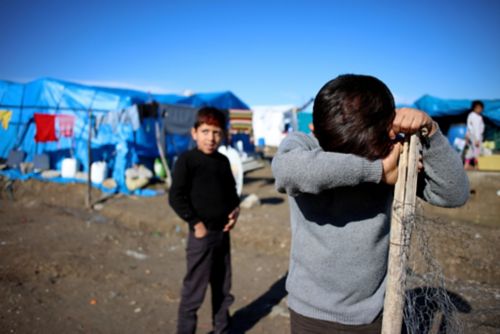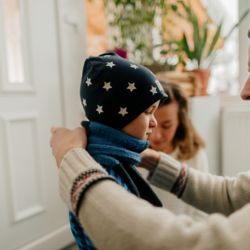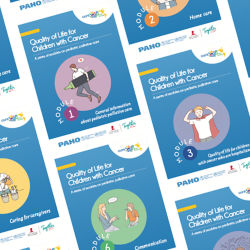How to Help Children Cope with War Trauma and Troubling Events

Learn to recognize the signs and symptoms of trauma in children to help them cope and get the care they need.
War and other troubling world events can feel unsettling, especially if you have concerns about safety in your local community or abroad. These feelings are common and valid and may include a range of emotions. You or your child may have outrage, fear, and sorrow.
People react differently to troubling events. Some may be directly affected as they try to escape conflict or give relief to others. Families living abroad may worry about verbal aggression, hate crimes, or other threats. Some families may go through loss or other events that might be traumatic before, during, or after leaving places where there are wars or conflicts.
Even if the war is far away, dealing with media coverage or social media posts can be difficult. The news can be upsetting and increase a person’s fear or anxiety. This fear can affect how a child thinks about these events and recovers afterward.
Signs and symptoms of trauma
Parents and caregivers can help provide support by learning the warning signs and symptoms of trauma. These symptoms can vary and impact children at any age, even infants. Children’s responses to traumatic events can include:
- Changes in behavior
- Intense emotions that do not go away
- Problems handling emotions
- Problems forming attachments with others
- Unable to do skills they could do before
- Trouble eating or sleeping
- Nightmares
- Problems paying attention
- Problems with school
- Low self-esteem
- Trouble feeling positive emotions
- Repeated stressful thoughts or memories about the traumatic event
- Negative beliefs about the world
- Avoiding certain people or places
- Trouble remembering things about the traumatic event
- Physical symptoms like aches and pains
- Acting on impulses or having risky behaviors, such as drug or alcohol use
- Worries about separation
- Increased acting out when they are upset
Children may get these symptoms when something reminds them of the traumatic event. The symptoms may interfere with a child’s daily functioning or their ability to interact with others. A person with a traumatic stress reaction may not show all these symptoms. Also, not everyone who has one or more of these symptoms has traumatic stress.
Help for children and teens with trauma
If you are concerned about your child’s or teen’s mental health following a traumatic event, talk with a doctor, mental health provider, therapist, counselor, social worker, or other care provider. You can find a mental health provider who is trained in treating trauma-related disorders. They can provide a safe place for your family to heal and offer other mental health services.
Several kinds of therapy are helpful for treating trauma-related problems. These include:
- Cognitive behavioral therapy (CBT, or trauma-focused CBT): This is a kind of therapy that helps the patient be aware of negative thoughts and beliefs to learn how to manage stress better.
- Psychological first aid (PFA): This approach provides safety and comfort and helps improve coping skills to reduce psychological distress.
- Eye movement desensitization and reprocessing (EMDR): This treatment focuses on changing how the brain stores memories of stressful events.
Medicines may also help in the treatment of trauma-related disorders in some cases.
How to talk with your child about trauma
You can guide conversations with your child to better understand how they are feeling and help them cope. Finding out what your child understands about world events or war can help them share and feel validated.
Before talking with your child, think about your own emotions about troubling events. War and conflict may bring up memories of trauma or loss. This can cause difficult emotions such as sadness, fear, and helplessness. When you understand your own emotions first, you can work through them and be more helpful.
Here are a few tips to help you talk with your child:
- Find a trusted friend or family member: These topics are upsetting for adults, so it can help to share your own thoughts and feelings with another adult. This will help you think about concerns you may wish to talk about with your child, and you will be better prepared.
- Seek the truth: You might want to learn about troubling events from trusted news sources to answer your child’s questions or concerns. It is OK to tell your child that you do not know the answer to a question. You can work together to find the answer.
- Be curious and open with your child: Do not assume you know what they are thinking and feeling. You may be surprised by what troubles them.
- Ask direct questions: This will help you understand how to respond to your child’s concerns.
- Name your own emotions: It is OK to share that you are upset by recent events, as well as what you believe, what you value, and how you think others should be treated. Naming emotions can help your child feel less frightened, especially for younger children. If you say things in an angry way, this may frighten your child. So, it is helpful to speak calmly to them about these topics.
- Reassure them of their safety: If your child is worried about their safety, you may need to talk to them about where the war is and assure them they are safe in their local community.
- Follow up: Check back with your child about questions they may have, especially when events change. This helps your child feel supported and lets them know that you will talk with them throughout a difficult situation. This lets you clear up anything they do not understand or identify false information.
Caregivers and families can help children cope and feel safe by keeping a regular routine.
Coping tips for families
It is helpful to limit how much media coverage your child sees or the discussions they hear about war and troubling events, especially for younger children.
Teens may find it helpful to watch news coverage with their caregivers and discuss it. They may ask questions even after the news coverage ends.
It may be helpful for family members to explore more information about the events. Families may also find comfort in working together to find ways to support others who are in crisis. For example, families may read more about the history of the region where events occur or donate to a charity.
Caregivers and families can help children cope and feel safe by keeping a regular routine.
Although you might want to stay informed from news updates, take a break from the news and connect with others or do fun activities. Activities may vary based on a child’s age and interests, but could include going on walks, playing games, or reading books together.
Your child will be better able to cope if they get support from family, friends, their school, and community. Focus on your child’s strengths, praise their ability to solve problems, and build a flexible approach to coping. Troubling world events can affect anyone, so it is important to be patient and care for both your child and yourself.





